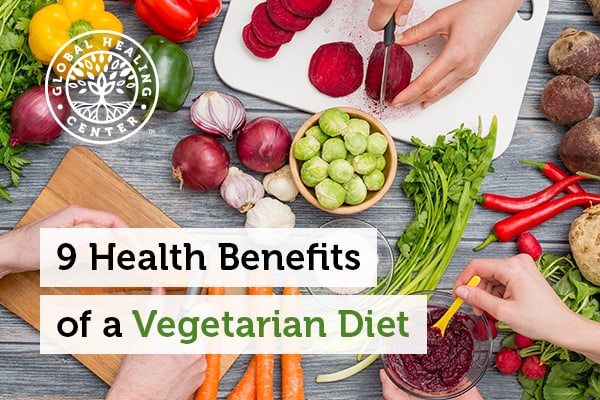The Abundant Rewards: Exploring the Benefits of Vegetarian Diets
In a world increasingly embracing plant-based lifestyles, the benefits of vegetarian diets are gaining recognition for their transformative impact on health and well-being. Let’s embark on a journey to uncover the wealth of advantages that come with adopting a vegetarian way of life.
Unveiling the Power of Plant-Based Eating
The surge in interest surrounding plant-based diets stems from their ability to provide a myriad of health benefits. From enhanced nutritional intake to sustainable weight management, the merits of embracing plant-centric nutrition are both compelling and diverse.

Nutrient-Rich Delights: Essential Components of a Vegetarian Diet
As we delve into the benefits of vegetarian diets, it’s essential to explore the rich nutrient profile that forms the backbone of plant-based eating. Understanding the key vitamins, minerals, and proteins abundant in vegetarian diets unveils the nutritional delights that contribute to overall health.
Key Nutrients Found in Abundance
Plant-based diets offer a treasure trove of nutrients, including vital vitamins like A, C, and K, minerals such as iron and potassium, and protein sources like legumes and tofu. This section will illuminate the nutritional richness that sets vegetarian diets apart, providing a foundation for optimal well-being.
Weight Management and Vegetarian Diets
One of the standout benefits of drawing individuals to vegetarian diets is their effectiveness in weight management. By exploring the relationship between plant-based eating and weight control, we can unravel the strategies that make vegetarian diets a powerful tool for those seeking a balanced and sustainable approach to weight.
Harnessing the Power of Plant-Based Eating for Weight Control
Vegetarian diets often boast lower calorie density and higher fiber content, making them conducive to weight loss and management. This section will delve into the science behind how plant-based eating supports these goals and offer practical insights for individuals seeking to achieve or maintain a healthy weight.
Heart Health: Nourishing Your Cardiovascular System with Vegetarian Diets
Heart health is a paramount concern for many, and the benefits of vegetarian diets extend a nourishing hand to cardiovascular well-being. Let’s explore the intricate connection between plant-based eating and maintaining a healthy heart.
Vegetarian Diets and Cardiovascular Well-Being
Scientific evidence suggests that adopting a vegetarian diet may contribute to lower cholesterol levels, reduced inflammation, and overall cardiovascular health. This section aims to dissect these findings, providing insights into how plant-powered choices can become a cornerstone for a robust and resilient heart.
Mindful Eating: Enhancing Mental Well-Being through Vegetarian Diets
Beyond physical health, vegetarian diets have been linked to positive outcomes for mental well-being and cognitive function. In this section, we’ll explore the intriguing connection between plant-based nutrition and fostering a clear and focused mind.
Cognitive Benefits of Plant-Based Nutrition
Research suggests that certain nutrients found in abundance in vegetarian diets, such as antioxidants and omega-3 fatty acids, may positively impact cognitive function. This part of our exploration aims to unravel the science behind these cognitive benefits and provide practical insights for those seeking mental clarity through their dietary choices.
Vegetarian Diets and Digestive Harmony
A well-functioning digestive system is fundamental to overall health, and vegetarian diets play a crucial role in promoting digestive harmony. In this section, we’ll delve into how plant-powered choices contribute to a healthy gut and overall digestive wellness.
Promoting Digestive Health through Plant-Powered Choices
The fiber-rich nature of many vegetarian foods is a key factor in supporting a healthy digestive system. By exploring the benefits of fiber and the impact of vegetarian diets on gut microbiome balance, readers will gain insights into how plant-based eating can become a foundation for digestive well-being.
Balancing Hormones: The Influence of Vegetarian Diets
Hormonal balance is crucial for overall well-being, and vegetarian diets may play a role in achieving harmony within the endocrine system. In this section, we’ll investigate the potential impact of plant-based eating on hormonal equilibrium.
Plant-Based Eating for Hormonal Equilibrium
Scientific studies suggest that certain components of vegetarian diets, such as phytoestrogens and antioxidants, may contribute to balancing hormones. This segment explores the current research, offering insights into how plant-centric nutrition can positively influence reproductive and overall hormonal health.
Aging Gracefully: Anti-Aging Effects of Vegetarian Diets
As individuals seek ways to maintain youthful vitality, the anti-aging effects of vegetarian diets have gained attention. In this section, we’ll uncover the specific antioxidants and nutrients found in plant-based foods that contribute to skin health and combat the signs of aging.
Vegetarian Diets and Skin Health
Antioxidants play a crucial role in protecting the skin from free radicals, contributing to a radiant complexion. This part of our exploration sheds light on the anti-aging benefits of vegetarian diets and how specific nutrients support skin health, offering a natural approach to maintaining a youthful appearance.
Vegetarian Diets and Chronic Disease Prevention
Preventing chronic diseases is a key focus of health-conscious individuals, and vegetarian diets have been associated with a lower risk of various health conditions. In this section, we’ll explore the evidence supporting the preventive nature of plant-based eating.
Reducing the Risk: Vegetarian Diets and Chronic Diseases
From diabetes to hypertension, vegetarian diets have shown promise in reducing the risk of chronic diseases. This segment delves into the research findings, providing readers with a comprehensive understanding of how plant-based nutrition can be a proactive step toward long-term health.
Frequently Asked Questions About the Benefits of Vegetarian Diets
1. Q: What are the primary health benefits of adopting a vegetarian diet?
A: Vegetarian diets offer various health benefits, including improved heart health, weight management, and reduced risk of chronic diseases.
2. Q: Can vegetarian diets provide sufficient protein for muscle health?
A: Yes, plant-based sources such as legumes, tofu, and quinoa can fulfill protein needs, supporting muscle health in a vegetarian diet.
3. Q: Do vegetarian diets contribute to weight loss?
A: Absolutely, the high fiber content and lower calorie density in many vegetarian foods make them conducive to weight loss and maintenance.
4. Q: How do vegetarian diets impact cardiovascular health?
A: Studies suggest that vegetarian diets may lower cholesterol levels, reduce inflammation, and support overall cardiovascular well-being.
5. Q: Can a vegetarian diet positively influence mental well-being?
A: Yes, certain nutrients in plant-based foods, like omega-3 fatty acids and antioxidants, may contribute to improved cognitive function and mental well-being.
6. Q: Are there specific nutrients vegetarians need to pay attention to?
A: While vegetarian diets can be nutritionally rich, individuals should focus on adequate intake of B12, iron, calcium, and omega-3 fatty acids.
7. Q: Can children thrive on a vegetarian diet?
A: Yes, with careful planning to ensure proper nutrient intake, children can thrive on a well-balanced vegetarian diet that meets their nutritional needs.
8. Q: How do vegetarian diets contribute to digestive health?
A: The fiber-rich nature of many vegetarian foods promotes a healthy digestive system and supports gut microbiome balance.
9. Q: Are there anti-aging benefits associated with vegetarian diets?
A: Yes, the antioxidants in plant-based foods contribute to skin health, offering anti-aging effects and promoting a youthful complexion.
10. Q: Can a vegetarian diet help prevent chronic diseases?
A: Research suggests that vegetarian diets may reduce the risk of chronic diseases, including type 2 diabetes, hypertension, and certain cancers.
Conclusion:
As we conclude our exploration into the benefits of vegetarian diets, it’s time to reflect on the holistic advantages and encourage readers to consider the positive impact of embracing plant-powered nutrition on their health and well-being. In this final section, we’ll recap the diverse benefits discussed throughout the article. By reiterating the transformative potential of vegetarian diets, we aim to leave readers inspired and equipped to embark on a journey toward a healthier and more vibrant future.




